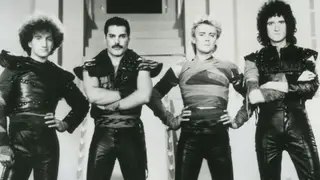The 25 best Classic Rock follow-up albums
24 August 2024, 14:00

How do you create a sequel to an all-time classic rock album? Is it possible for the follow-up to outshine the original? Radio X looks at some of the greatest examples of when artists go one better.
Listen to this article
-
Led Zeppelin - Led Zeppelin II
- Release date: 22nd October 1969
- Followed-up: Led Zeppelin I (January 1969)
From the orgasmic opener Whole Lotta Love to the ridiculously epic Ramble On, this is a fantastic follow-up that propelled Zeppelin towards their ambition to be the greatest rock band in the world.
Led Zeppelin - Led Zeppelin II. Picture: Alamy -
Aerosmith - Pump
- Release date: 12th September 1989
- Followed up: Permanent Vacation (August 1987)
1987's Permanent Vacation saw the Boston rockers re-energised and rehabilitated in the wake of their massively popular collab with Run DMC, Walk This Way. But Pump topped that album's success, spawning the singles Love In An Elevator and Janie's Got A Gun, going seven times Platinum in the US, as opposed to the mere five times Platinum its predecessor sold.
Aerosmith - Pump album cover. Picture: Press -
The Doors - Strange Days
- Release date: 25th September 1967
- Followed up: The Doors (January 1967)
After an assured debut, the LA psychedelic rock band swiftly made this sequel, which moves from the witchy title track, through the bluesy Love Me Two Times and the avant garde Horse Latitudes, winding up with the epic When The Music's Over. And there's a hit single in the shape of People Are Strange.
The Doors - Strange Days album cover. Picture: Alamy -
Pink Floyd - Wish You Were Here
- Release date: 12th September 1975
- Followed up: The Dark Side Of The Moon (March 1973)
It took a whole two years after the release of the epic Dark Side Of The Moon for the Floyd to gather their thoughts, but while Wish You Were Here didn't overtake the former in terms of sales, it did make it to Number 1, unlike its predecessor. Wish You Were Here has gained more acclaim over the years thanks to the gentle title track and the space opera of Shine On You Crazy Diamond.
Pink Floyd - Wish You Were Here album cover. Picture: Alamy -
The Rolling Stones - Let It Bleed
- Release date: 28th November 1969
- Followed up: Beggars Banquet (December 1968)
After The Stones lost their way in the psychedelic year of '67, Beggars Banquet saw them reconnect with their roots and the group became cuttting edge again. With this masterful collection of R&B, blues, country and gospel, the Stones eclipsed The Beatles in terms of influence and stature. From the chilling Gimme Shelter to the euphoric You Can't Always Get What You Want, this is a superb album.
The Rolling Stones - Let It Bleed album cover. Picture: Alamy -
The Beatles - The Beatles (aka "The White Album")
- Release date: 22nd November 1968
- Followed up: Sgt Pepper's Lonely Hearts Club Band
We don't count Magical Mystery Tour round these parts, as the sprawling "White Album" was the offical ful length follow-up to the acclaimed Sgt Pepper. It sets out to be the complete opposite of Pepper: blank artwork, weird links, avant garde sound collages and a few bits of throwaway fun. Critics claim it's not as focused as Sgt Pepper or Revolver, but here's where The Beatles kick back and bask in their own talent, a record made for themselves.
The Beatles White Album. Picture: Alamy -
Black Sabbath - Paranoid
- Release date: 18th September 1970
- Followed up: Black Sabbath (February 1970)
Issued hot on the heels of Sabbath's hugely influential debut album, the follow up had a huge international hit in Paranoid and was certified four times Platinum in the US.
Black Sabbath - Paranoid album cover. Picture: Alamy -
Fleetwood Mac - Tusk
- Release date: 12th October 1979
- Followed up: Rumours (February 1977)
Following one of the biggest selling albums of all time was always going to be tricky, so the band took two years to complete this ambitious double album, which was still certified doubel Platinum in the US. The hypnotic title track was a solid hit, as was Stevie Nicks' song Sara.
Fleetwood Mac - Tusk album. Picture: Alamy -
The Who - Quadrophenia
- Release date: 26th October 1973
- Followed up: Who's Next (August 1971)
Who's Next is a rock classic, but the conceptual follow-up was a double album dedicated to the Mod scene of the mid 60s. After the release of the fulm Quadrophenia in 1979, the parent LP's stature has only grown over the years.
The Who - Quadrophenia album. Picture: Alamy -
Blondie - Eat To The Beat
- Release date: September 1979
- Followed up: Parallel Lines (September 1978)
Parallel Lines is rightly cited as the essential Blondie album, but its sequel was no slouch either: Eat To The Beat matched the commercial success of its predecessor and included some amazing tracks, such as Atomc, Union City Blue and Dreaming.
Blondie - Eat To The Beat album cover. Picture: Alamy -
David Bowie - Aladdin Sane
- Release date: 19th April 1973
- Followed up: The Rise & Fall Of Ziggy Stardust & The Spiders From Mars (June 1972)
Bowie's outing as Ziggy Stardust definied a generation, but stalled at Number 5 in the UK charts and didn't even break the US Top 20. Its follow-up, Aladdin Sane, fared better, topping the British album charts and spawning the singles Jean Genie and Drive-In Saturday.
David Bowie - Aladdin Sane album cove. Picture: Alamy -
Electric Light Orchestra - Discovery
- Release date: 1st June 1979
- Followed up: Out Of The Blue (October 1977)
The album that gave the world Mr Blue Sky was hugely popular across the globe, but its follow-up went three places higher in the UK album charts: it peaked at Number 1. This was thanks to some outstanding Jeff Lynne productions, including Confusion, Don't Bring Me Down and The Diary Of Horace Wimp.
Electric Light Orchestra - Discovery album cover. Picture: Alamy -
Eagles - The Long Run
- Release date: 24th September 1979
- Followed up: Hotel California (December 1976)
Another album that lived in the shadow of one of the biggest-selling albums in history, The Long Run also topped the US album charts and was certified seven times Platinum by the RIAA - not quite as many as its predecessor, which was 26 times Platinum!
Eagles - The Long Run album cover. Picture: Alamy -
The Police - Regatta de Blanc
- Release date: 5th October 1979
- Followed up: Outlandos d'Amour (November 1978)
The pop-punk trio made a splash with their 1978 debut album, but its follow-up went one better, topping the UK charts and gaining Platinum status. The LP included their first two number one singles: Message In A Bottle and Walking On The Moon. The Police would only get bigger after this.
The Police - Regatta de Blanc album cover. Picture: Alamy -
Def Leppard - Hysteria
- Release date: 3rd August 1987
- Followed up: Pyromania (January 1983)
The Sheffield rockers' 1983 album Pyromania was a shift towards a more radio-friendly sound, aided by producer "Mutt" Lange, but its follow-up saw the band head into the big leagues, with hits like Animal, Pour Some Sugar On Me, Rocket and Love Bites. It went 12 times Platinum in the States.
Def Leppard - Hysteria album cover. Picture: Alamy -
Metallica - Metallica
- Release date: 12th August 1991
- Followed up: ...And Justice For All (September 1988)
1988's ...And Justice For All was a commercial breakthrough for Metallica, even giving them a Top 20 hit in Britain with One. But the self-titled "Black Album" was even more popular and saw the metal legends cross over into the mainstream, topping the British and US charts and going 16 times Platinum in their home country.
Metallica - The Black Album. Picture: Alamy -
U2 - The Joshua Tree
- Release date: 9th March 1987
- Followed up: The Unforgettable Fire (October 1984)
The Irish band's fourth album The Unforgettable Fire was a sizeable hit in Britain, topping the charts and being certified double Platinum by the BPI. But the follow-up three years later put U2 onto another level, selling five times as many copies as its predecessor in the UK and giving us the hits I Still Haven't Found What I'm Looking For, With Or Without You and more.
U2's The Joshua Tree album cover. Picture: Alamy -
Bon Jovi - New Jersey
- Release date: 19th September 1988
- Followed up: Slippery When Wet (August 1986)
Slippery When Wet was a solid hit for Bon Jovi, but its follow-up went even bigger: Number 1 on both sides of the Atlantic, it went double Platinum at home and seven times Platinum in the USA, spawning the hits Bad Medicine, I'll Be There For You and Lay Your Hands On Me.
Bon Jovi - New Jersey album cover. Picture: Alamy -
Iggy Pop - Lust For Life
- Release date: 9th September 1977
- Followed up: The Idiot (March 1977)
The former Stooge's first solo album was recorded while camped out with David Bowie in West Berlin, but the follow-up, issued a few months later, topped that: the pounding title track and The Passenger mean this is the key Iggy Pop album and the one to own.
Iggy Pop - Lust For Life album cover. Picture: Alamy -
AC/DC - Back In Black
- Release date: 25th July 1980
- Followed up: Highway To Hell (July 1979)
Highway To Hell saw the Aussie rockers in the UK Top 10 for the first time, but tragedy intervened when singer Bon Scott died on 19th February 1980. The group reconvened with new vocalist Brian Johnson and the subsequent album topped th British charts and went an astonishing 27 times Platinum in America.
AC/DC - Back In Black album cover. Picture: Alamy




























